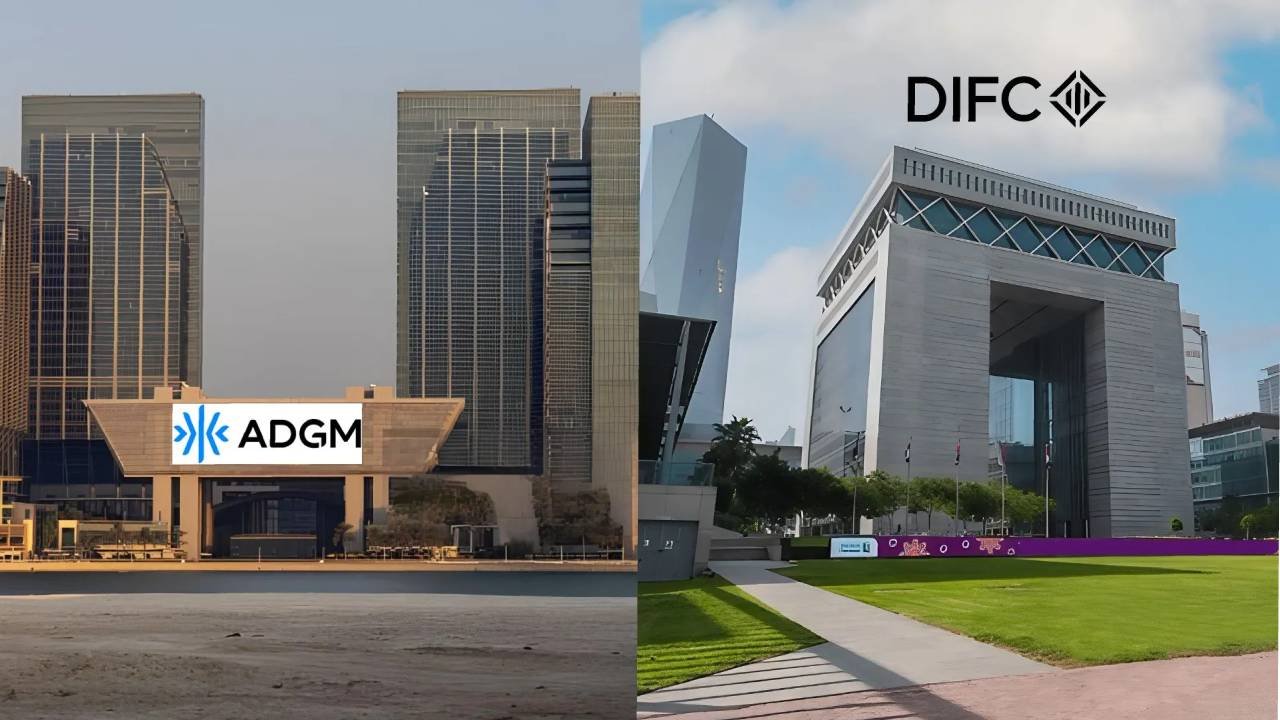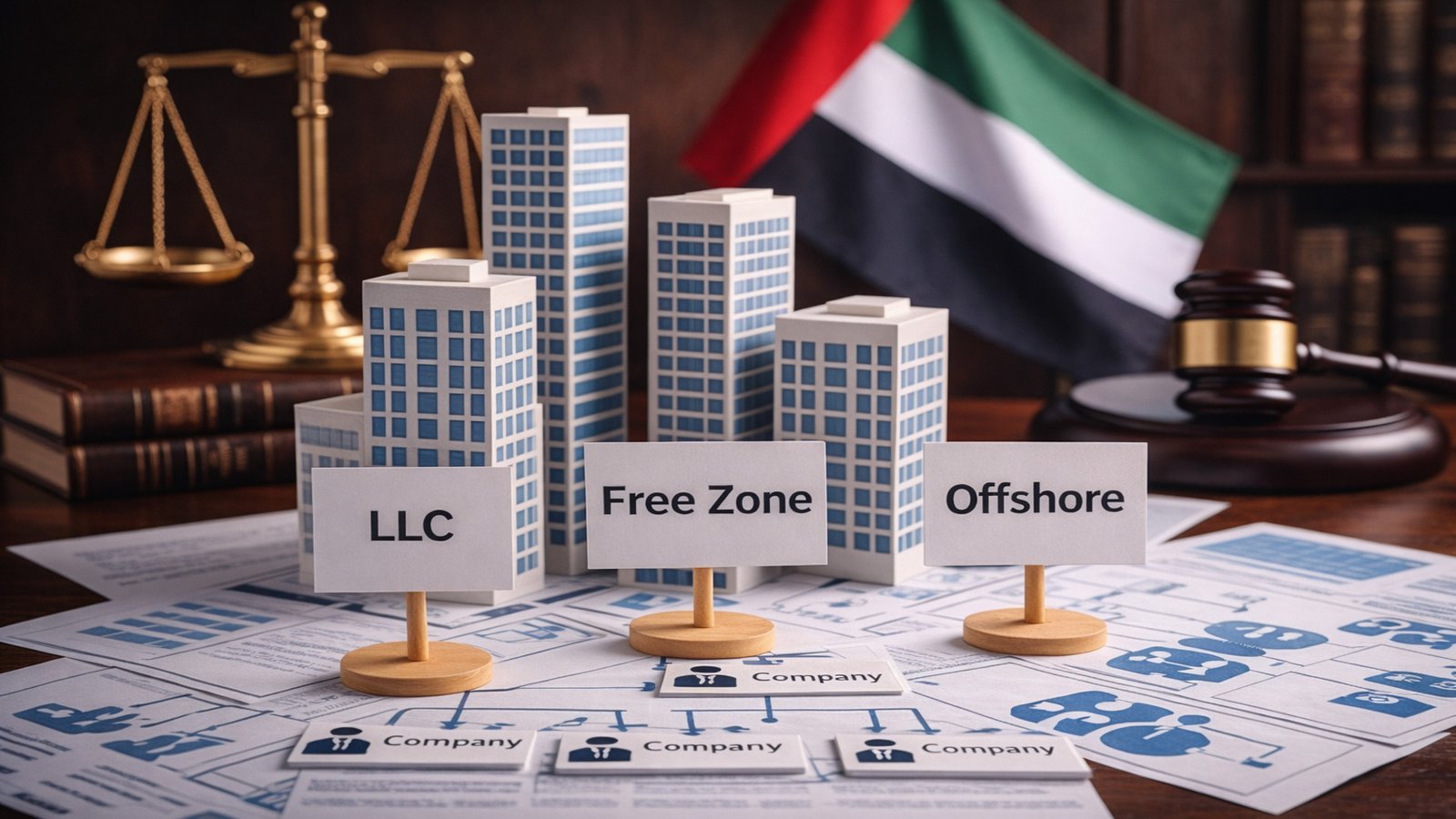When fund managers compare DIFC vs ADGM, they are choosing between two of the world’s most active financial free zones. Both offer a familiar common law environment, minimal corporate tax for qualifying entities, and full foreign ownership, but they differ in legal form, regulatory style, speed to market and the types of fund families they tend to attract.
DIFC vs ADGM for Financial Services
DIFC (Dubai International Financial Centre) and ADGM (Abu Dhabi Global Market) are both leading UAE financial centres with independent regulatory frameworks and common law court systems designed to support international finance. DIFC is more established with strong global banking, wealth management and family office networks, while ADGM, though newer, has rapidly attracted asset managers, private market structures and digital asset firms by positioning itself as an innovation-friendly hub. Both centres offer similar legal structures, regulatory certainty and business-friendly environments for sophisticated financial services.
Legal Framework and Dispute Resolution
A first key difference sits in the legal architecture. ADGM adopts English law principles more directly within its legal system. DIFC operates under its own set of regulations that are modelled on English law. The upshot is subtle but important for documents and precedent. The Dubai International Arbitration Centre, which is based in the DIFC, provides a well-regarded and globally recognised platform for dispute resolution, with internationally qualified arbitrators.
Both jurisdictions offer specialist commercial courts with judges experienced in complex financial disputes. If your fund structure is closely associated with the U.K, or is headquartered in the U.K, the alignment with English law can make setting up a branch in ADGM, a suitable option.
Regulatory Approach and Fund Types
DIFC is regulated by the Dubai Financial Services Authority, DFSA. ADGM is regulated by the Financial Services Regulatory Authority, FSRA. Both regulators operate modern frameworks for funds, but their approaches differ in practice.
Both centres permit a range of fund vehicles, including domestic, foreign, and various specialist funds. The exact licence class, capital thresholds and ongoing reporting vary. For managers focusing on private capital, co investment or digital assets, ADGM’s flexibility and recent guidance often suits new strategies.
Market Access and The Ecosystem
DIFC sits at the heart of Dubai’s financial cluster and benefits from deep private client networks, exchange infrastructure and a large population of international wealth advisers. ADGM sits close to Abu Dhabi’s major institutional investors and sovereign pools, and its growth in active companies and assets under management has been sharp. Recent reporting shows rapid expansion in both hubs, with ADGM recording strong year on year growth in active firms and DIFC reporting a rise in company registrations in 2024 and 2025. Those trends matter when your distribution strategy relies on proximate investors or institutional relationships.
If your investors are institutional or you want to be near sovereign or state owned asset managers, ADGM’s proximity to Abu Dhabi decision makers can be an important practical advantage. If you rely on private client channels, family offices and Dubai market depth, DIFC’s ecosystem will likely meet your needs.
Tax, Ownership and Other Operational Matters
Both free zones offer full foreign ownership, and corporate tax benefits. Currency choice, banking relationships and custody options differ by location and should be tested with prime banks early in the process. Pragmatically, one should evaluate service provider availability.
Practical Checklist for Fund Managers
Before making a decision, one must determine:
- Which investors will you target and where are they located?
- Which asset classes will you run and which sector will you target?
- Which region or emirate do you wish to target?
If you need a starting point for regulatory applications, review the respective fund guidance and draft your constitutional documents with the chosen jurisdiction in mind. For managers specifically considering formation in Dubai, you may wish to review options for DIFC Fund Formation in UAE in your interlinking plan.
Which Jurisdiction for Which Fund Type?
1. ADGM Structures for Private Equity and Co-Investment Funds
ADGM is a preferred jurisdiction for private equity managers due to its flexible structuring options and capacity to support specialised features in fund arrangements. ADGM offers enhanced confidentiality through the use of a Restricted Scope Company (RSC), giving sponsors a discreet and adaptable vehicle for co-investment and private market strategies.
2. Hedge funds are not specific to DIFC.
Both jurisdictions work well. DIFC’s established trading and prime brokerage links can be attractive for market facing strategies.
3. Both DIFC and ADGM have digital asset laws.
ADGM’s guidance and fintech friendly posture make it a natural home for certain tokenised or crypto native funds. Always confirm the regulator’s current position for your exact token economic model.
Practical Next Steps
- Prepare a short fund memo describing strategy, target investor types and projected AUM.
- Run a jurisdictional feasibility study covering licensing route, expected fees and timetable.
- Speak with two local fund administrators and a custodian to test market appetite.
- Engage counsel with proven experience in the chosen free zone. A specialist adviser will flag drafting differences in constitutional documents and regulatory expectations.
For a concise roadmap to structure options in Abu Dhabi, consider reviewing materials on ADGM Fund Structures UAE to align planning documents with local practice.
Conclusion
There is no universal answer to the question DIFC vs ADGM. If you prize a long-established financial centre with deep private client networks, DIFC is compelling. If you value legal alignment with updated English law, flexibility for private market structures or a fast-moving innovation agenda, ADGM will often be the better fit. Your choice should follow a short but disciplined process: define investor base and asset class, compare regulatory routes and costs, and test operational partners for custody and administration. When you make the comparison with clear facts and a simple checklist, the right jurisdiction becomes the obvious one.














































